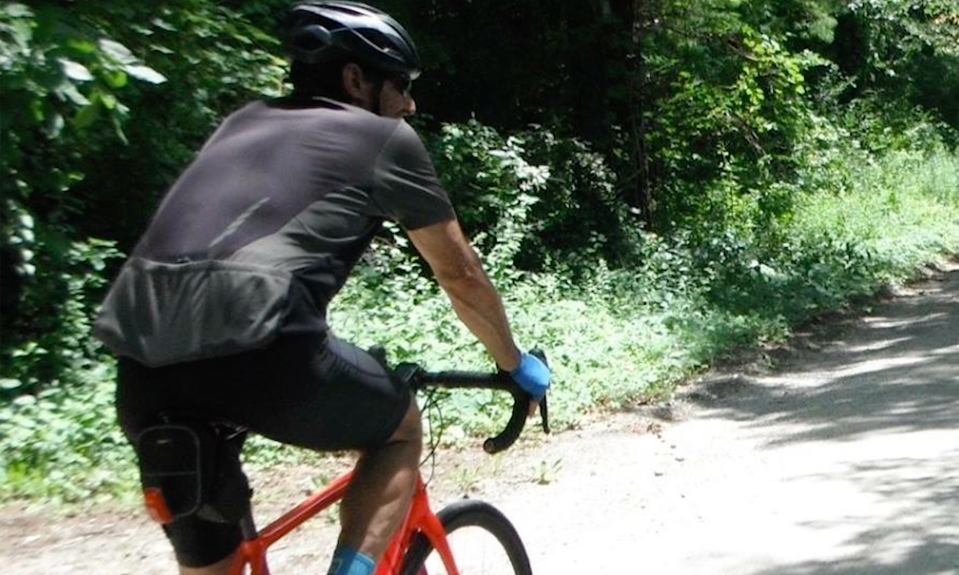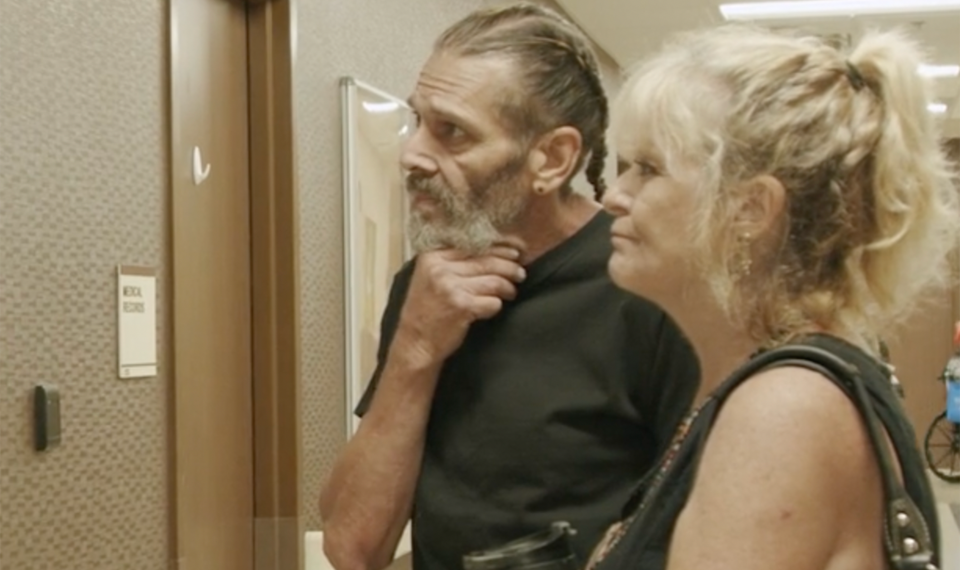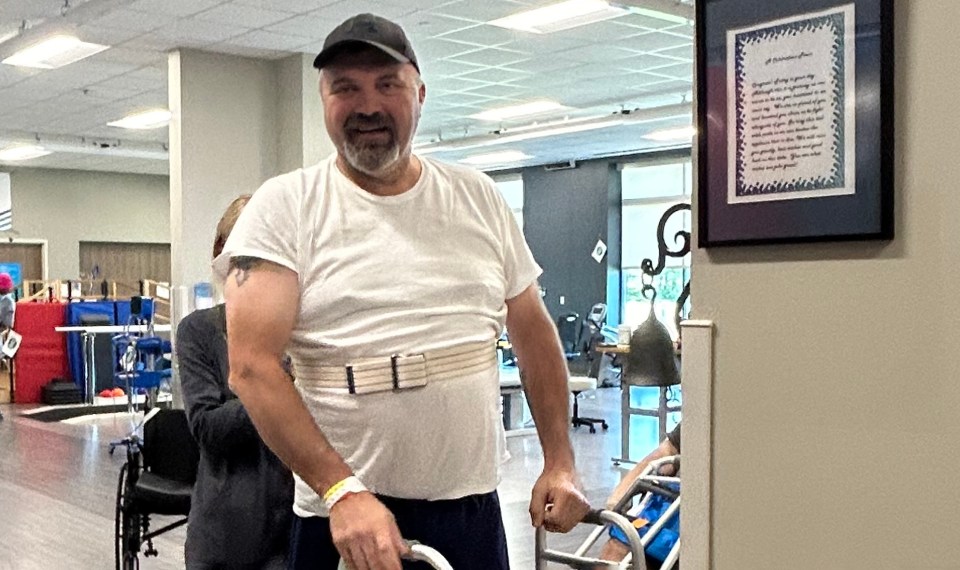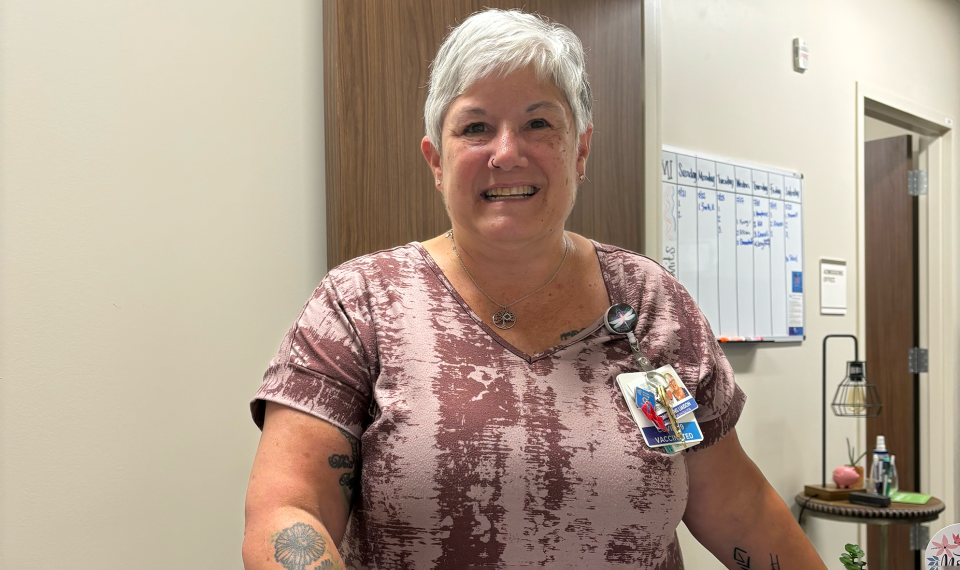It was a beautiful spring day in 2021 when Kevin Sola was on one of his long bike rides in Conway, South Carolina. He recalls there wasn’t a cloud in the sky, but that’s the only thing he would remember until three weeks later when he awoke in a hospital bed.
Sola was struck by a van. The force shattered his helmet and left him with a severe brain injury, as well as broken bones and internal injuries. The trooper who was dispatched to the scene had to resuscitate Sola twice before she drove him to the hospital. His injuries were so severe, he lost more than 70 percent of his blood.
“That trooper carried me—and I’m close to 200 pounds and in shape,” Sola later learned. “She carried me to her car and drove me herself. I was in a coma for three weeks with tubes in my throat and stomach. It was a disaster. I had no clue where I was when I woke up. I thought it was a dream.”
He slowly came to the realization that it wasn’t a dream, though, and woke to the reality that he might never be able to cycle again.

From 200 Miles a Day to Zero
Solo, 62, had just retired two weeks before the accident. The New Yorker was spending time in his vacation home near Myrtle Beach where long bike rides were common place.
An avid cyclist and outdoors man, he would frequently ride more than 200 miles a day and rode competitively, as well as recreationally.
When he woke up in a hospital bed, he could hardly move, let alone walk or ride a bike. After months recovering in the hospital, it was clear he would need intense rehabilitation if he wanted to even partially recover, but having been healthy his entire life, he was unsure where that care should take place.
“I’d never spent a night in a hospital in my entire life, and then I went to spending three months,” he said. “This was something completely unfamiliar to me. I’d had no experience with it.”
Thankfully, his ex-wife did. As a nurse, she knew he needed a hospital level of care combined with intensive physical and occupational therapy. After doing his own research, to locate such a provider, Sola found Tidelands Rehabilitation Hospital, an affiliate of Encompass Health.
As an inpatient rehabilitation hospital, Tidelands has 24/7 nursing care and frequent physician visits—something Sola required with his injuries still fresh—and three hours of therapy, five days a week.
“I didn’t want to go to one of those places where you sit there and rot,” Sola said. “They told me I needed to go to this kind of place. With God’s will and blessing I did, because I don’t know if I would’ve ever sat up again if I hadn’t.”
Regaining His Independence
When Sola arrived at Tidelands he was still almost completely immobile. He knew his stay—and recovery—required physical and occupational therapy, but he was unsure if he could tolerate it.
“I didn’t want to do anything at first; I thought it was a waste of time,” he recalled. “I was really in a hopeless state. My one goal at this point was to be self-sufficient. I live by myself and am used to doing everything myself.”
Sola’s physical therapist worked on helping him rebuild his strength and balance, as well as overcoming his fear of reinjuring himself. His occupational therapist helped him practice activities of daily living (ADLs), such as getting in and out of a car using the car simulator in the therapy gym and navigating his walker in the kitchen in the hospital’s ADL suite.
With some tough love and encouragement, Sola took to his therapy as he did his cycling races—one mile at a time. “I’ve always been competitive, so thinking about repetition and the better you get with practice motivated me,” he said.
While his therapy team helped him rebuild his strength and regain some of his independence, his nursing team tended to his medical needs. His care team also included a dietitian, who helped him make sure he was getting the proper nutrients to recover.
“The level of care and recovery was so precise,” Sola said. “I fell into very good hands. I still had severe wounds, and the nurses helped with that. The nutritionist would make sure I was eating what I needed. She had me double up on protein.”
Sola was at Tidelands Rehabilitation for four weeks. He said it wasn’t easy, and jokingly referred to his therapy team as “drill sergeants,” but the work was worth it. When he left the rehabilitation hospital, he was able to walk again with the assistance of a walker and could care for himself, something that was unimaginable to him the day he entered Tidelands.
“It was amazing,” he said. “They didn’t take any of my, ‘I don’t feel like it,’ which I needed. I was at the right place at the right time for me.”
Getting Back to His Bike
Not long after returning home, Sola had to get on his bike trainer to see if he even had the mobility required to ride and pedal a bike. He did, which gave him hope. In the months after leaving Tidelands, Sola continued to recover and grow stronger. Soon, he was riding his bike again.
He had one last surgery related to his accident in September, and said now, “there is nothing stopping me.” He is back to riding his bike daily and signed up to compete in a 62-miler this summer. After that, who knows what’s next.
“As a cyclist, I know that the first 75 miles are nice, and then you hit a wall and then the endorphins kick in,” he said. “I don’t know how my body will react with all these injuries; it’s just a matter of going for it.”
The content of this site is for informational purposes only and should not be taken as professional medical advice. Always seek the advice of your physician or other qualified healthcare provider with any questions you may have regarding any medical conditions or treatments.


